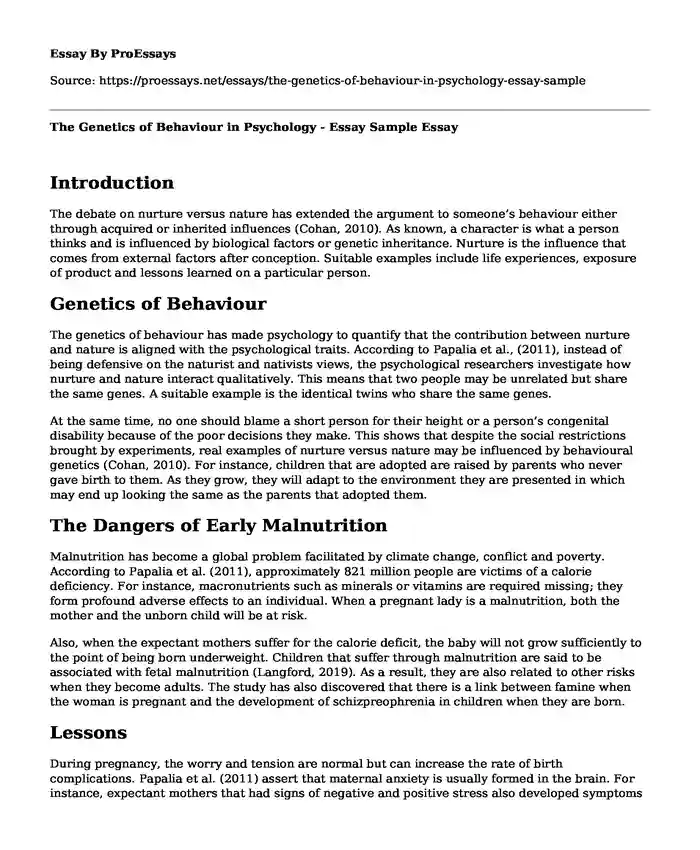Introduction
The debate on nurture versus nature has extended the argument to someone’s behaviour either through acquired or inherited influences (Cohan, 2010). As known, a character is what a person thinks and is influenced by biological factors or genetic inheritance. Nurture is the influence that comes from external factors after conception. Suitable examples include life experiences, exposure of product and lessons learned on a particular person.
Genetics of Behaviour
The genetics of behaviour has made psychology to quantify that the contribution between nurture and nature is aligned with the psychological traits. According to Papalia et al., (2011), instead of being defensive on the naturist and nativists views, the psychological researchers investigate how nurture and nature interact qualitatively. This means that two people may be unrelated but share the same genes. A suitable example is the identical twins who share the same genes.
At the same time, no one should blame a short person for their height or a person’s congenital disability because of the poor decisions they make. This shows that despite the social restrictions brought by experiments, real examples of nurture versus nature may be influenced by behavioural genetics (Cohan, 2010). For instance, children that are adopted are raised by parents who never gave birth to them. As they grow, they will adapt to the environment they are presented in which may end up looking the same as the parents that adopted them.
The Dangers of Early Malnutrition
Malnutrition has become a global problem facilitated by climate change, conflict and poverty. According to Papalia et al. (2011), approximately 821 million people are victims of a calorie deficiency. For instance, macronutrients such as minerals or vitamins are required missing; they form profound adverse effects to an individual. When a pregnant lady is a malnutrition, both the mother and the unborn child will be at risk.
Also, when the expectant mothers suffer for the calorie deficit, the baby will not grow sufficiently to the point of being born underweight. Children that suffer through malnutrition are said to be associated with fetal malnutrition (Langford, 2019). As a result, they are also related to other risks when they become adults. The study has also discovered that there is a link between famine when the woman is pregnant and the development of schizpreophrenia in children when they are born.
Lessons
During pregnancy, the worry and tension are normal but can increase the rate of birth complications. Papalia et al. (2011) assert that maternal anxiety is usually formed in the brain. For instance, expectant mothers that had signs of negative and positive stress also developed symptoms of an accelerated neurological disorder that became persistent over time. When a mother has chronic stress, then the preterm delivery period may change due to the high levels of stress hormones.
Depression also affects the development of a person. For instance, children that were depressed while in their mother’s womb were born premature, delayed to develop as toddlers and had high levels of antisocial and violent behaviours when they reach the adolescence stage (Shin et al., 2012). Adults who learn to cope with stress develop good behaviours. However, people are threatened their bodies prepare them to react by increasing the heart rate, stress hormones and blood pressure.
Conclusion
The result is that the healthy stress response system is developed. However, when the stress levels are long-lasting and extreme, it weakens and damages the brain architecture, which comes to either lifelong repercussions (Shin et al., 2012).
References
Cohan, M. (2010). Nature/Nurture debate. Encyclopedia of Gender and Society.
https://doi.org/10.4135/9781412964517.n306
Langford, R. (2019). Introduction. Theorizing Feminist Ethics of Care in Early Childhood Practice.
https://doi.org/10.5040/9781350067509.ch-001
Papalia, D., & Feldman, R. (2011). Experience human development (14th ed.). McGraw-Hill Education.Shin, S., Song, J., & Hong, M. (2012). Ascorbate recycling causes brain damages by oxidative stress. European Neuropsychopharmacology, 12, 372.
https://doi.org/10.1016/s0924-977x(02)80605-8.
Cite this page
The Genetics of Behaviour in Psychology - Essay Sample. (2023, Nov 25). Retrieved from https://proessays.net/essays/the-genetics-of-behaviour-in-psychology-essay-sample
If you are the original author of this essay and no longer wish to have it published on the ProEssays website, please click below to request its removal:
- Individual Critical Reflection Paper on a Pregnant Woman
- Depression and Mental Health Must Be Taken Seriously in Schools
- The Differential Diagnosis of Attention Deficit Hyperactivity Disorder (ADHD) And Sensory Modulation Disorder (SMD)
- Critical Thinking in Nursing Process and Plan of Care Essay
- Paper Example on Trauma as Public Health Issue
- Teratogens: Causes of Congenital Deformities in Fetuses - Essay Sample
- Essay Example on Nursing Student Characteristics: Skills for Future Success







